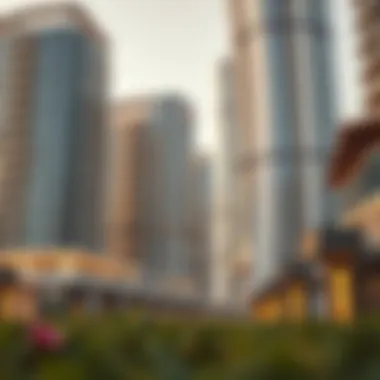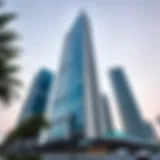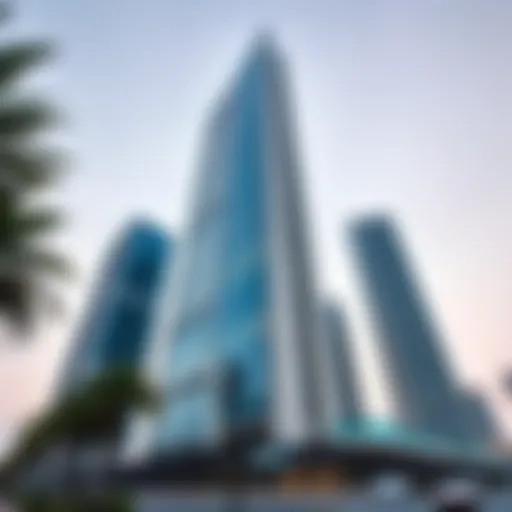Comparing Life in Abu Dhabi and Dubai: Key Insights


Intro
Life in the United Arab Emirates offers a spectrum of experiences, particularly when comparing the contrasting yet complementary cities of Abu Dhabi and Dubai. Each city, while tightly interlinked by geography and culture, presents unique opportunities and challenges for potential residents and investors. Understanding the lifestyle, cost, and investment prospects in these metropolitan areas is crucial for those contemplating a move or investment in this vibrant region.
Abu Dhabi, the capital of the UAE, is often seen as a bastion of tradition blended with modern progress. Here, the pace of life is relatively relaxed, and one can find a rich tapestry of culture, including museums like the Louvre Abu Dhabi and beautiful parks that evoke a sense of peace.
In contrast, Dubai is a bustling hub of commerce and tourism, known for its iconic skyline and a more dynamic social scene. It's a city that never sleeps, constantly evolving with new attractions and a fast-paced lifestyle that attracts many.
This article intends to navigate through the lifestyle and investment landscape in both emirates. It will delve into essential areas such as the real estate market trends, cost of living, cultural nuances, community dynamics, and potential investment opportunities. With this comprehensive exploration, readers can make informed decisions about living or investing in either city.
Cultural Foundations
The cultural foundations of Abu Dhabi and Dubai play a pivotal role in shaping the lifestyle and identity of both emirates. Understanding the nuanced fabric of their cultures not only enhances one’s perspective on daily life but also lays the groundwork for fostering connections within the community. These cultural elements reflect the Emirati heritage, beliefs, and values, providing a strong sense of place that influences everything from business to leisure.
Historical Context
Delving into the historical context of these two cities reveals rich narratives that have shaped their present-day character. Abu Dhabi, the capital of the UAE, encompasses an ancient history steeped in tradition. Historically, it began as a fishing and pearling village, where the idyllic coast attracted settlers. The discovery of oil in the mid-20th century catalyzed its transformation into a modern metropolis, but the essence of its Bedouin legacy remains intact.
Conversely, Dubai’s history is marked by its evolution from a small trading port into a global economic hub. Established as a key commercial center, Dubai's cosmopolitan culture is a melting pot of influences from various parts of the world. This dynamic blend of cultures enriches the narrative of both cities, making them unique yet intertwined in their development.
Traditions and Customs
When it comes to traditions and customs, both Abu Dhabi and Dubai offer a colorful array of practices that reflect their deep-rooted heritage. In Abu Dhabi, you might find the Emirati allure in traditional dance forms such as the Ayallah, performed during special occasions. Such customs are often paired with Arabic poetry, highlighting the city’s commitment to preserving its cultural identity.
Dubai also embraces its customs but tends to blend them with more contemporary influences, a testament to its globalized atmosphere. Festivals such as Eid al-Fitr and the Dubai Shopping Festival showcase this cultural richness while promoting both local traditions and modern lifestyles.
Among significant cultural initiatives, you can see entities like the Sheikh Mohammed Centre for Cultural Understanding, which aims to bridge gaps between different cultures residing in these emirates. Initiatives like these not only highlight the importance of cultural education but also help in fostering inclusivity and understanding across diverse communities.
"Culture is the neighborhood that houses our identity; in both Abu Dhabi and Dubai, this identity is continually evolving yet remains rooted in age-old traditions."
Economic Landscape
The economic landscape of both Abu Dhabi and Dubai plays a crucial role in understanding the lifestyle and opportunities each city presents. It’s not just the numbers that matter but the underlying characteristics that make each emirate unique. Investors and residents alike must consider various aspects such as economic growth, real estate markets, and the abundance of opportunities.
Overview of Economic Growth
Dubai has often been seen as the flashy city, with skyscrapers like the Burj Khalifa and an array of luxury shopping destinations. Its economy is robust, benefiting from trade, tourism, and finance. In contrast, Abu Dhabi, while also modern, boasts a wealth of natural resources, specifically oil, which significantly contributes to its economic standing. This reliance on oil has shaped its growth, leading to investments in infrastructure and diversification into sectors like tourism and culture.
Interestingly, both cities are making strides in diversifying their economies, with Abu Dhabi focusing on sustainable energy initiatives. The UAE Vision 2021 plans aim to develop a knowledge-based, highly productive economy.
This growing focus on sustainability and diversification leads to a fertile ground for future business developments.
Real Estate Markets
The real estate markets in Abu Dhabi and Dubai are distinct yet interconnected. Each city offers a variety of investment opportunities that cater to different investor appetites.
Investment Opportunities
When considering investment opportunities in real estate, Dubai often steals the limelight. Known for its dazzling developments, Dubai offers a range of options from luxurious villas to high-end apartments. The characteristic of constant innovation in architecture makes it appealing. For instance, investing in properties like those in the Dubai Marina is often seen as a lucrative choice due to high rental yields and constant demand.
On the other hand, Abu Dhabi provides a different flavor. The capital city’s property market offers stability, which is often appealing to conservative investors. Areas like Al Reem Island are becoming increasingly popular for both expats and locals, highlighting ongoing developments that signal growth potential. The abundance of government-backed projects can bring more assurance to potential investors.
However, both markets have their pros and cons. Dubai’s market may seem overly saturated in some segments, while Abu Dhabi’s slower pace can also turn off potential investors seeking rapid growth.
Market Trends
Monitoring market trends of real estate in both cities reveals significant differences. Dubai’s market is reactive; it quickly adapts to global economic shifts and the whims of investors, often leading to fluctuating prices. Recent trends indicate a cooling market that now favors buyers, which could be an attractive point for first-time homebuyers. This, however, contradicts the previous boom that led to inflated prices.
Abu Dhabi’s market, in contrast, has maintained a more resilient character due to fewer speculative investments. There’s notable price stability, and while it may not offer the same explosive growth potential as Dubai, it appeals to those who prefer a more long-term approach.
Cost of Living Comparison
Understanding the cost of living is crucial when considering a move or investment in the UAE. Both Abu Dhabi and Dubai have unique economic environments, which directly affect everyday expenses. A thorough comparison can help potential residents and investors make informed decisions about where to spend their time and money. It’s not just about numbers; it’s about lifestyle and the kind of experiences each city offers.
Housing and Rent
When it comes to housing, both cities have their perks and pitfalls. Abu Dhabi generally offers more spacious living units compared to Dubai, with prices often being lower for similar amenities. You might find a two-bedroom apartment in Abu Dhabi for around AED 90,000 per year, while in a bustling area of Dubai, the same could easily reach AED 120,000. However, if you’re looking to live close to the beach or in a newly developed area in Dubai, those numbers can shoot through the roof.
- Dubai: Prices escalate significantly in neighborhoods like Downtown and Dubai Marina.
- Abu Dhabi: More affordable in areas such as Al Reem Island and Al Ain.
It's worth noting that while rents can be higher in Dubai, the availability of luxury flats and high-end amenities makes it appealing for those who prioritize lifestyle. In contrast, Abu Dhabi offers a quieter residential experience, which may appeal to families and expatriates working in government sectors.
Utilities and Services
Utilities comprise a significant part of monthly expenses and can vary dramatically between these two cities. In Abu Dhabi, utility costs for a family can hover around AED 800 to AED 1,200 per month, depending on the size of the accommodation. In Dubai, the same utility bill could range between AED 1,200 to AED 1,800, with air conditioning being a major contributing factor, especially during the sweltering summer months.
- Electricity & Water: Both cities employ differing tariffs, potentially impacting monthly budgets.
- Internet Services: Dubai tends to offer more affordable internet packages, often bundled with other services.
Additionally, service charges can also add to the total living costs. In some luxury buildings, these charges can be quite steep, pushing the cost of living higher than originally anticipated.
Transportation Costs
Transportation is a significant aspect when evaluating the cost of living. In Abu Dhabi, public transportation is limited, but the city is developing its infrastructure. Currently, taxis and ride-sharing apps are your best bet, with average fares starting at AED 12. Meanwhile, Dubai has a more comprehensive public transport system, including the Metro, buses, and trams. A monthly pass for public transportation in Dubai costs around AED 300, which can be a money-saver for daily commuters.


- Taxi Fares: Generally starting around AED 12 in both cities but can increase based on time and location.
- Metro & Tram Services: Dubai's RTA has an extensive network that makes commuting easier and often cheaper.
This difference highlights that while you can still save money on transport in Abu Dhabi, the convenience and efficiency of Dubai's systems often justify the extra cost for many residents.
"When you look at the cost of living, you have to consider not just your budget, but also what kind of lifestyle you want to lead."
Thus, embarking on a journey through the cost of living comparison reveals more than just numbers—it opens up an understanding of what life could be like in these two vibrant cities.
Lifestyle and Leisure
Examining lifestyle and leisure is crucial when comparing Abu Dhabi and Dubai. These two emirates not only present distinct environments but also offer a diverse array of recreational opportunities that define how residents and visitors interact with their surroundings. In both cities, lifestyle choices are as varied as a buffet. The leisure activities available reflect broader cultural values, community engagement, and personal enjoyment.
Investors, homeowners, and analysts looking to tap into these markets must consider lifestyle aspects, as they play a significant role in the appeal of each city. Let’s explore how recreational activities and culinary experiences shape the leisure landscape.
Recreational Activities
Outdoor Leisure
Outdoor leisure in both Abu Dhabi and Dubai makes up a vital part of their allure. Known for their sunny weather and beautiful landscapes, these cities encourage a lifestyle that integrates the great outdoors. Activities like hiking in the Hajar Mountains or enjoying beach time at Jumeirah Beach reflect not only a commitment to health and well-being but also to community bonding and social interaction.
One deciding factor in popularity is the availability of parks and recreational spaces. Abu Dhabi's Corniche, with its family-friendly beaches and pedestrian pathways, is a prime example. Residents often flock here for picnics, jogging, or a serene escape from urban life. In contrast, Dubai offers the stunning Al Qudra Lakes, where one can partake in cycling or simply relax in nature’s embrace.
The distinct characteristic of outdoor leisure is its adaptability; whether you prefer an adrenaline-pumping adventure or a quiet, contemplative moment, there’s something for everyone. However, seasonal temperature shifts can be a disadvantage for outdoor pursuits in the sweltering summer heat, which may limit outdoor activities during peak times.
Indoor Entertainment
Indoor entertainment thrives as a crucial aspect of lifestyle in these bustling cities. From state-of-the-art shopping malls to iconic attractions like the Louvre Abu Dhabi orDubai's Mall of the Emirates, options are endless. These venues do not just house shops, but also cinemas, art galleries, and family entertainment centers, catering for all ages.
The charm of indoor entertainment is its ability to provide a controlled environment. In the cooler months, people from both cities utilize these spaces to socialize, shop, and explore. For instance, the Ski Dubai attraction allows residents a unique skiing experience in a desert setting.
On the downside, reliance on indoor activities could potentially lead to a sedentary lifestyle, which is often viewed critically by health enthusiasts. Yet, the vast variety means that boredom is rarely an issue in these urban settings.
Dining and Culinary Experiences
Dining represents another highlight of life in Abu Dhabi and Dubai. Both cities offer rich culinary scenes that reflect their multicultural fabric. Investors in the dining sector would do well to note these trends as they can significantly impact lifestyle choices and community engagement.
Local Cuisine
Local cuisine makes for a compelling aspect of the culinary landscape. In Abu Dhabi, traditional Emirati dishes such as Al Harees—a wheat and meat dish—reflect the cultural heritage and familial ties that resonate throughout the region. Experiencing local cuisine is not just a meal; it’s a glimpse into the traditions and social life of the residents. This cultural richness draws many food lovers, adding to the city's character.
However, one must consider that local fare may sometimes be viewed as too limited for foreign palates looking for diverse tastes. The challenge lies in striking a balance between honoring tradition and catering to a global audience.
International Dining Options
International dining options are plentiful and vibrant, particularly in Dubai. The city's standing as a global metropolis means you'll find everything from exquisite French bistros to authentic Indian eateries. This eclectic mix not only showcases Dubai’s multicultural identity but also caters to varying tastes and preferences, making it a haven for food enthusiasts.
For investors and entrepreneurs, the thriving scene around international dining is advantageous as it attracts tourists and expatriates alike. The challenge, however, might be a saturated market where standing out requires creativity and innovation. Yet, the opportunity to offer something new in the food sector is always enticing, ensuring a constant influx of foodies.
Community and Social Life
Community and social life are integral to understanding the nuances between Abu Dhabi and Dubai. These elements help shape the experience of residents and play a crucial role in how individuals adjust to life in either city. The vibrancy and inclusivity of a community often serve as the backbone of social life, impacting both personal fulfillment and professional opportunities. In these cities, where tradition meets modernity, the interaction among diverse groups leads to enriching experiences that cater to locals and expatriates alike.
Expatriate Communities
Expatriate communities in Abu Dhabi and Dubai are a cornerstone of social dynamics. Both cities boast large populations of expatriates from various countries, contributing to a melting pot of cultures and perspectives. This element offers both challenges and opportunities for integration. For instance, social clubs and organizations serve not just as support systems but also as vibrant hubs of cultural exchange. These communities often host events and gatherings that foster connections among members from different backgrounds.
In Dubai, neighborhoods like Jumeirah attract a significant proportion of Western expatriates, while Abu Dhabi's Al Reem Island sees a blend of Europeans and Asians. The diversity is truly striking and often creates a comfortable environment for foreigners, allowing them to find their niche rather easily. This sense of belonging can be vital for maintaining mental well-being, especially for those who have relocated for work or family reasons.
Public Amenities and Facilities
Healthcare Services
Healthcare services available in Abu Dhabi and Dubai play a significant role in both cities' desirability for residents. One key characteristic is the availability of state-of-the-art facilities and healthcare providers, offering a range of medical solutions that cater to the global population. With many hospitals ranked highly in international ratings, residents can find specialized care in almost every medical field. This makes it a popular choice for those who prioritize health and well-being in their decision to live in either city.
A unique aspect of healthcare in these emirates is the blend of private and public systems. Private healthcare facilities, like the American Hospital Dubai or the Cleveland Clinic in Abu Dhabi, often have shorter wait times and advanced technology but come at a premium cost. Conversely, the public healthcare services are more accessible but may not always meet the speed or level of service offered by private institutions.
For expatriates, health insurance is often a requirement, which influences their choice of healthcare facilities. Understanding the options available and the potential out-of-pocket costs can greatly affect one’s overall experience and satisfaction with the healthcare system.
Educational Institutions
Educational institutions are another key facet of community life in Abu Dhabi and Dubai. Families looking to relocate need to consider the quality and variety of educational options available for their children. Both cities house esteemed international schools that deliver curriculums from British, American, and other educational systems. This characteristic not only makes these institutions popular but also underscores the cities’ appeal to families moving for employment reasons.
The unique feature of schools in these emirates is their focus on a holistic education that encompasses not just academics but also sports, arts, and cultural awareness. Many schools facilitate community service projects, aiding in the development of socially responsible citizens who engage actively with their surroundings. However, the high costs associated with international schools can be a hurdle for some families, necessitating careful financial planning.
In summary, the community and social life in Abu Dhabi and Dubai reflect a rich tapestry woven from diverse cultures and experiences. Whether through expatriate communities or public amenities such as healthcare and education, the contrast and comparison between these two cities provide invaluable insights for individuals considering a move, investment, or a deeper understanding of life in the UAE.
Architecture and Urban Planning
The distinctive character of both Abu Dhabi and Dubai can be greatly attributed to their architectural features and urban planning strategies. This aspect plays a significant role in shaping the identity of these cities, reflecting their cultural heritage while also catering to modern requirements and aspirations. The designs of buildings and the planning of urban spaces go beyond aesthetics; they influence daily life, economic opportunities, and even community interactions. By diving into areas like iconic landmarks and urban developments, we can understand how these elements contribute to the allure of living and investing in these emirates.
Iconic Landmarks
Abu Dhabi and Dubai are home to several architectural marvels that capture the imagination of both residents and visitors alike.
- Burj Khalifa: The tallest building in the world looms over Dubai, standing as a symbol of innovation and luxury. Not just a skyscraper, it serves as a beacon for global tourism and investment, bringing with it a wave of opportunities for both hospitality and retail businesses.
- Louvre Abu Dhabi: This museum is a striking example of cultural fusion and modern design. Housing art and artifacts from around the globe, it's not only an educational site but also an elegant piece of architecture that attracts art lovers from diverse backgrounds.
- Sheikh Zayed Grand Mosque: A masterpiece of Islamic architecture, the mosque embodies the spirit and traditions of the UAE. It draws in tourists and inspires local pride, reinforcing the overall community’s cultural identity.


These landmarks do more than just beautify the skyline; they have a role in economic stimulation, tourism, and social cohesion, reminding residents of the rich heritage and aspirations that the cities represent.
Urban Development Initiatives
The ongoing urban development initiatives in Abu Dhabi and Dubai illustrate the cities’ commitment to growth and innovation.
- Dubai Expo 2020: Although postponed, the preparations for this international exhibition have ushered in a wave of infrastructure upgrades and new developments, enhancing transportation networks, hospitality, and public amenities, ensuring the city keeps expanding its global profile.
- Saadiyat Island Development: In Abu Dhabi, this initiative aims to transform the island into a cultural district featuring museums, art galleries, and eco-friendly residential units. The balance of modernity and sustainability fosters an attractive lifestyle for residents, making it a hotspot for investments.
- Dubai 2040 Urban Master Plan: This ambitious project highlights sustainable living, improved public transport, and increased green spaces. The focus is on creating a more livable city that caters to both locals and expatriates, providing a more inclusive urban experience.
Investors and analysts should take note of how these initiatives present opportunities for residential properties, commercial ventures, and sustainable projects. The continual development reflects a forward-thinking approach that aligns with global standards, essential for both living and investing in these vibrant cities.
"The architectural landscapes of Abu Dhabi and Dubai are not merely constructions; they are representations of aspirations and cultural narratives that define their existence in the modern era."
Ultimately, the evolution of architecture and urban planning in both Emirates illustrates not just physical growth but also the interplay of culture, economy, and community life—paramount considerations for anyone looking to relocate, invest, or simply take part in the unfolding story of these dynamic regions.
Education and Employment Opportunities
Education and employment opportunities play a critical role in the decision-making process for those considering a move to either Abu Dhabi or Dubai. Both cities are known for their dynamic job markets and a plethora of educational institutions that cater to diverse needs. The importance of these opportunities cannot be overstated, as they significantly impact not only individual career growth but also the overall quality of life one can expect in these vibrant emirates.
In analyzing job market trends, it becomes clear that Abu Dhabi and Dubai each offer unique conditions. While Dubai often boasts a fast-paced, cosmopolitan environment with a high demand for skilled professionals in sectors like finance, tourism, and technology, Abu Dhabi tends to focus more on sectors such as oil, government, and construction. For expats and job seekers, understanding these distinctions can help in tailoring job applications and paving a successful career path.
Job Market Overview
The job landscape in Dubai is notably dynamic. The emirate acts as a magnet for talent due to its status as a global business hub. Unemployment rates are relatively low, hovering around 2% to 3%, reflecting strong economic performance and growth. High-paying jobs and lucrative opportunities can often be found in:
- Information Technology: A sector that continues to grow, driven by digital transformation initiatives.
- Hospitality and Tourism: With millions of tourists flocking to the city, there’s a continuous demand for skilled professionals.
- Finance and Business Services: Dubai’s global financial center offers numerous roles, from banking to consultancy.
In contrast, Abu Dhabi's job market is influenced by its position as the capital of the UAE. Here, professions tied to the government and energy sectors reign supreme. Oil and gas specialists, for instance, often find abundant job openings that reflect the emirate's economic backbone. Additionally, Abu Dhabi supports career development initiatives which can be advantageous for professionals seeking long-term career stability.
The salary packages may vary significantly between the two cities, with Dubai generally offering higher salaries but also higher living costs. Understanding these intricacies can lead to better employment decisions for expatriates and UAE nationals alike.
Educational Systems
When it comes to education, both Dubai and Abu Dhabi offer robust systems that cater to a wide array of academic needs. The educational institutions range from primary schools to universities, many of which align with international standards. This aspect can be crucial for families considering either emirate as their new home.
In Dubai, the education sector is diverse, with many schools offering British, American, and Indian curricula. Parents often prioritize international schools due to their global recognition. The availability of world-renowned universities like the American University in Dubai or the University of Wollongong adds to Dubai’s appeal for higher education.
Abu Dhabi also boasts quality educational options but perhaps with a slightly different focus. Numerous public schools are free for UAE nationals, while expatriates largely depend on private institutions reflecting various educational systems. The presence of institutions such as the University of Abu Dhabi showcases the emirate's commitment to higher education.
"Education is not just preparation for life; education is life itself."
For further information on job trends and educational opportunities, consider exploring resources such as LinkedIn, Gulf Business, or Education UAE.
Safety and Security
When considering living in urban environments such as Abu Dhabi and Dubai, one can hardly overstate the role of safety and security in everyday life. The reassurance that comes with knowing you are in a secure area can not only enhance your quality of life but also encourage economic investment in property and businesses. In both cities, crime rates and law enforcement represent significant factors that impact residents' experiences.
Crime Rates
Crime rates in Abu Dhabi and Dubai are generally low compared to global standards, particularly when pertaining to violent crime. The peaceful atmosphere allows families to explore neighborhoods freely without the nagging worry of danger lurking around every corner. In fact, Abu Dhabi often ranks among the safest cities in the world, with reports mostly highlighting petty theft and scams as the common nuisances rather than serious crimes.
In Dubai, the situation is similar. You’ll find a very tight-knit community where residents often interact without fear. The crime statistics are so favorable that there exists an almost communal pride about the city's safety record. According to various reports, incidents of serious crime like mugging are extremely rare.
To offer a clearer picture, here’s a breakdown of the perceived safety in these cities:
- Abu Dhabi: Low instances of violent crime; instances are typically confined to minor queries or misunderstandings.
- Dubai: Quick response times to reported incidents, contributing to a general sense of security.
Above all, understanding that these cities promote safety as a selling point can ease apprehension about relocation, especially for families or those considering investments.
Law Enforcement Presence
Law enforcement in both Abu Dhabi and Dubai is robust yet generally unobtrusive. Policing practices in these emirates differ slightly but share a common thread: a focus on community-oriented policing. Uniformed officers are often seen patrolling neighborhoods, acting more as a presence of assurance rather than intimidation.
In Dubai, the police department has successfully embraced modern technology. They’re not just engaging in traditional foot patrols; smart cars with high-tech gadgets equipped to monitor traffic and ensure adherence to laws roam the streets. It’s not uncommon to see police officers engaging with the public, organizing community events, or comforting a tourist who may feel lost. The police force's strategy builds trust and cooperation with citizens and residents.
Abu Dhabi, meanwhile, approaches law enforcement by emphasizing dialogue. The police often conduct awareness campaigns focusing on education about safety and legal matters. How the law enforcement agencies maintain order, prevent crimes, and handle public safety is a point of pride in both societies. There’s more to the law enforcement presence than the badge; it speaks to a community’s ethos.
“Safety transcends law enforcement; it’s about creating a culture where people feel connected and secure.”
In summary, both Abu Dhabi and Dubai showcase high standards in safety and security, making them appealing choices for potential residents and investors. The low crime rates, coupled with visible, proactive law enforcement, create an environment that is conducive to a stable life. Whether you’re looking to relocate or simply explore investment opportunities, you can feel at ease knowing that your wellbeing is a priority.
Transportation Infrastructure
Transportation infrastructure plays a vital role in shaping the daily life and economic vitality of both Abu Dhabi and Dubai. These two cities, although part of the same country, offer distinct transportation frameworks that cater to their unique urban environments and populations. Understanding these systems not only helps potential residents and investors navigate their choices but also reveals the underpinnings of each city’s growth.
Public Transport Systems
Abu Dhabi and Dubai invest heavily in their public transport systems, aiming to create accessible and efficient options for their inhabitants. One notable point is the Dubai Metro, which stands out as a marvel of modern engineering. The fully automated and driverless metro system is clean, safe, and designed to connect key areas of the city seamlessly. With two lines operating and a third under construction, the Metro not only reduces traffic congestion but offers a reliable alternative for thousands of commuters daily.
Conversely, Abu Dhabi has developed its bus network as the backbone of public transportation. The Department of Transport oversees a comprehensive bus system that connects various neighborhoods and points of interest. While it may not boast the same level of automation or speed as Dubai's Metro, the bus service facilitates affordable and convenient travel across the capital. As of now, plans are underway to implement a tram system, which promises to further enhance the public transport landscape in Abu Dhabi in the coming years.
The growth of ride-sharing services, such as Uber and Careem, complements these public systems, providing additional flexibility for those who prefer more direct routes. Thus, both cities offer varied options that cater to different preferences.
The expansion of public transportation in both Abu Dhabi and Dubai is pivotal, as it not only eases urban mobility but also aligns with sustainability goals, reducing overall carbon footprints.
Benefits of Effective Public Transport


- Decreased traffic congestion
- Affordable mobility options for residents
- Environmental benefits associated with reduced vehicular emissions
- Enhanced accessibility to essential services and opportunities for all citizens
Road Networks
The road networks in Dubai and Abu Dhabi differ not just in size, but in their engineering and urban planning philosophies. Dubai's road system is dynamic, featuring expansive highways that facilitate swift movement across the city. Notable thoroughfares like the Sheikh Zayed Road are iconic for their busy traffic, comprising multiple lanes and strategically placed interchanges. The extensive use of expressways showcases the city’s growth ambitions and caters to the ever-increasing population and tourist influx.
On the other hand, Abu Dhabi’s road system, while also modern, offers a different flavor. It tends to be more spacious and less congested, which can be appealing for those seeking ease of travel. Significant roads such as the Sheikh Khalifa Highway connect the main parts of the city and its suburban areas, providing access without the frenetic pace observed in Dubai. The design also emphasizes scenic views and greenery, adding to the overall aesthetic appeal of the journey.
Considerations about Road Networks
- Traffic Management: Both cities have made strides in managing traffic flows using intelligent systems that monitor and control congestion.
- Infrastructure Investment: Continuous investment by the government reflects long-term planning aimed at accommodating expected growth in populations and industries.
- Safety Standards: Considerable emphasis is placed on road safety, with initiatives aimed at educating drivers and minimizing accidents.
- Environmental Concerns: Plans are in place to incorporate more sustainable practices, like encouraging biking and walking via integrated pathways and green belts.
For more information on public transport options in the UAE, you might visit Dubai Roads and Transport Authority or Abu Dhabi Department of Transport.
Tourism and Visitor Experience
Exploring Abu Dhabi and Dubai reveals two distinct realms of tourism, each with its own unique flavors and offerings. Both cities serve as gateways to not only the UAE but also to the rich tapestry of Middle Eastern culture. Potential visitors and investors alike should consider the tourist experience as pivotal; it shapes perceptions, drives economies, and informs future investment strategies.
In Abu Dhabi, visitors are often drawn to the Emirate's cultural landmarks, museums, and heritage sites. The Sheikh Zayed Grand Mosque, for example, is not just a place of worship but a symbol of the cultural harmony that defines the UAE. Meanwhile, Dubai is synonymous with luxury and innovation, boasting attractions like the Burj Khalifa and extensive shopping malls.
Understanding the tourist experience is instrumental for stakeholders—whether you're a homeowner eyeing rental opportunities or an investor looking to capitalize on the burgeoning tourism sector. Recognizing how assets in both cities are influenced by seasonal tourism spikes can provide a tactical advantage when making decisions.
Tourist Attractions
Tourist attractions are a significant part of what makes Abu Dhabi and Dubai appealing. In Abu Dhabi, the blend of modern architecture contrasting with traditional beauty offers visitors a holistic view of the Emirate's past and present. The Louvre Abu Dhabi, a remarkable blend of art and culture, houses a plethora of artworks from around the globe. It offers a deep dive into the world’s history, making it a must-visit.
- Key Attractions in Abu Dhabi:
- Sheikh Zayed Grand Mosque: A marvel renowned for its stunning architecture and intricate details.
- Louvre Abu Dhabi: A cultural hub showcasing global art.
- Yas Island: Home to theme parks like Ferrari World and Yas Waterworld, perfect for families.
- Qasr Al Watan: The Presidential Palace that opens its doors to showcase UAE’s heritage.
Conversely, Dubai's attractions focus on the ultramodern lifestyle and architectural wonders. The Burj Khalifa, the tallest building in the world, offers sweeping views that take your breath away. Not to be overlooked, Dubai Mall boasts an aquarium, ice rink, and every high-end store imaginable.
- Prominent Attractions in Dubai:
- Burj Khalifa: An iconic symbol of the Emirates’ ambition.
- Dubai Mall: A haven for shoppers and entertainment seekers.
- Palm Jumeirah: An extraordinary man-made island lauded for luxury resorts.
- Desert Safaris: A unique experience that combines adventure with Emirati culture.
Visitors in both cities often engage in cultural experiences as well, such as traditional markets, local festivals, and art exhibitions, which further enrich their stay.
Accommodations
Accommodations in Abu Dhabi and Dubai cater to all needs, ranging from opulent hotels to budget-friendly hostels. This diversity not only enhances tourism but also encourages repeat visits as travelers find suitable places that fit their preferences.
In Abu Dhabi, luxurious options like the Emirates Palace offer unmatched service and sublime environments, providing guests with a taste of Emirati hospitality. Meanwhile, more affordable yet comfortable accommodations are available in the form of boutique hotels in the Al Ain area.
- Noteworthy Accommodation Options in Abu Dhabi:
- Emirates Palace: A lavish hotel often frequented by dignitaries and tourists.
- Hilton Abu Dhabi Yas Island: Perfect facility on Yas Island for family-friendly stays.
- Al Diar Sawa Hotel: Ideal for budget-conscious visitors without compromising on comfort.
On the flip side, Dubai is teeming with accommodations from the extravagant Burj Al Arab to mid-range hotel chains like Novotel. The competitive lodging market here means tourists are often treated to deals, especially during the off-peak seasons, thereby making it easier for budget travelers and families.
- Prominent Accommodation Choices in Dubai:
- Burj Al Arab: The epitome of luxury, often referred to as the world's only seven-star hotel.
- Rove Hotels: A modern and affordable chain appealing to younger travelers and tourists.
- Atlantis, The Palm: A dream destination for families, featuring an aquarium and a waterpark.
In summary, both Abu Dhabi and Dubai offer a rich array of attractions and accommodations that cater to a diverse audience. Understanding these elements provides valuable insight not just for potential visitors but also for investors looking to capitalize on the robust tourism industry in the UAE.
"Tourism is more than just a business; it’s a gateway to fostering cultural interaction and community development."
For further detailed insights into tourism in the UAE and its role in the economy, explore resources at Wikipedia, Britannica, or local governmental sites like Visit Abu Dhabi and Dubai Tourism.
With both cities continuing their efforts to enhance tourism and visitor experiences, it remains vital to keep a close eye on trends and upcoming developments.
Future Prospects
Future prospects for Abu Dhabi and Dubai are pivotal in understanding the long-term viability and attractiveness of these cities for residents and investors alike. As the global landscape evolves, both emirates have embarked on ambitious plans that are not only shaping their economies but also enhancing their appeal as desirable destinations. This sure provides a clear view for anyone considering a move or investment in these bustling markets.
Economic Predictions
The economic landscape in both cities is undergoing substantial transformation amid changing global dynamics. Abu Dhabi, with its rich oil reserves, is diversifying its economy through initiatives like Vision 2030, aiming to reduce its reliance on oil revenues. Similarly, Dubai is seeking sustainability through innovation and entrepreneurship, aligning itself with the global trend towards knowledge-based economies. The competition between the two emirates fosters unique opportunities.
Some key predictions include:
- Increased foreign investments: Both places are increasingly welcoming foreign capital, enhancing their positions on the global investment map.
- Solid expansion in the tourism sector: With the Expo 2020's impact still resonating, the tourism industry is set to bloom, benefiting both cities in the process.
- Advancements in technology and infrastructure: Smart city initiatives and significant upgrades in infrastructure will facilitate smoother business operations, which can attract more global companies.
Realizing these predictions will require prudent management and adaptive policies. The economy's resilience against global shocks, such as pandemics or oil price fluctuations, inherently influences these projections.
Real Estate Developments
The real estate sector in Abu Dhabi and Dubai continues to evolve, driven by increasing demand for housing and commercial spaces. With ongoing urban development projects, such as the Mohammed bin Rashid City in Dubai and Al Maryah Island in Abu Dhabi, the landscape offers exciting opportunities for both homeowners and investors.
Several elements are noteworthy when discussing real estate developments:
- Luxury and affordable options: While Dubai is famous for its opulent living spaces, Abu Dhabi is catching up, offering diverse housing options that cater to different income brackets. There’s something for everyone, so to speak.
- Sustainable building practices: Developers are increasingly adopting eco-friendly materials and energy-efficient designs. This trend not only responds to market demands but also positions the cities favorably in the eyes of environmentally-conscious investors.
- Regulatory frameworks: Clarity and transparency in laws surrounding property ownership enhance confidence among investors. Both emirates have been working on improving these frameworks, making them more accessible and appealing.
In closing, keeping an eye on the pulse of economic predictions and real estate developments can provide valuable insights for potential investors and residents. The future is bright in these cities, but it demands vigilance and willingness to adapt to the changing tides.
"Abu Dhabi and Dubai's future is defined by resilience, innovation, and unwavering ambition."
For more information, you might find these resources helpful:















